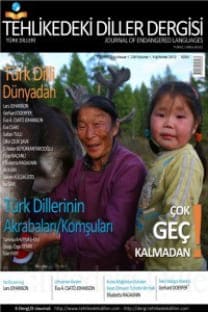Binicilik Kültürü ile İlgili Kazak ve Türk Atasözleri
Proverbs describe cultural practice within a particular language. Linguistic anthropological features and cultural phenomena are always easily recognized in comparative and contrastive study of proverbs of two culturally specific societies. The study may successfully display the proverbial concept of culture by means of abstraction and interpretation of proverbs of two societies in Turkic world. Thus, the linguistic interpretation of proverbs directs to a proverbial theory and demonstrates linguistic and cultural peculiarities of societies.
This paper examines proverbs on equestrian culture in Kazakh and Turkish languages. It aims to find out how proverbs are formed and what formation principles serve. Then, these principles define the underlying features of the linguistic theory of culture outlined in linguistic anthropology by Duranti (1997), McKenna (1974), Ennis (2015), Gibbs, Johnsson and Colston (1996). This linguistic theory of culture leads to understand how equestrian culture has been developed in both countries in Turkic world, and what features are mainly prioritized in a specific society.
Anahtar Kelimeler:
equestrian sport, culture, proverbs, Kazakh, Turkish, proverbial theory of culture.
Kazakh and Turkish Proverbs on Equestrian Culture
___
- Alymbaeva, Z. A., Ramazanov, T. B., & Sagatbek, S. N. Cultural And Semantic Nature Of The Concept «Horse». Herald, 175.
- Bhuneswar, C. (1997). A Sociolinguistic Analysis of Selected Telugu and English Proverbs. PGDTE Project. Hyderabad: CIEFL.
- Chakyroglu, A. K., Suiyerkul, B., Aitmukhametova, K., Turumbetova, Z., & Smanova, B. (2018). Analysis of the proverbs related to the lexemes "tongue/language". Opción: Revista de Ciencias Humanas y Sociales, (85), 97-115.
- Duranti, A. (1997). Linguistic Anthropology. Cambridge: Cambridge University Press. pp. 23-50.
- Geertz, C. (1973). The Interpretation of Cultures. New York: Basic Books.
- Khaidarov, A.T. (2004). Khalyq danalyghy: qazaq maqal-mătelderīnīn͡g tu̇sīndīrme sȯzdīgī zhăne zertteu. Toghanaĭ
- Mazhitayeva, S., Omasheva, Z., Tazhikeyeva, A., Kadyrov, Z., Talaspayeva, Z., & Otynshina, S. (2015). Universal and Idioethnic Characteristics of Proverbs and Saying with Zoonyms in the English and Kazakh Languages. Rev. Eur. Stud., 7, 178.
- Mieder, W. (1992). A dictionary of American proverbs. New York: Oxford University Press.
- Tompson, J.B. (1992). Ideology and Modern Culture. Oxford: Polity Press. pp. 125-162.
- Tursyn, N., & Abisheva, S. (2018). Cross-cultural Peculiarities Of English, Russian And Kazakh Proverbs With Zoonyms. In Lingvodidaktika i mezhkul'turnaya kommunikatsiya: aktual'nyye voprosy i perspektivy issledovaniya, pp. 392-398.
- Wilson, F.P. (1975). The Oxford Dictionary of English Proverbs Third Edition. Oxford: The Clarendon Press.
- Zhumabekov, K. Z. The Use Of Horses In The Kazakh And Turkish Proverbs. Herald, 59.
- Başlangıç: 2012
- Yayıncı: Ülkü ÇELİK ŞAVK
Sayıdaki Diğer Makaleler
Kaşkayı Türkleri Üzerine: Çeşitli Açılardan Bakış
Samad MOGHANIRAHIMI, Ezgi Nur OKUTAN
Eski Uygurca-Ḫotence Bir Sözlükçenin Tehlikedeki Türk Dillerinde İzleri
Eski Türkçede Kullanılan Barınak Adlarının Altay Türkçesi ve Teleüt Ağzında Görünümü
Binicilik Kültürü ile İlgili Kazak ve Türk Atasözleri
Assel TEMİRBEKOVA, Süer EKER, Ardak BEİSENBAİ
Tonga Sözcüğünün Kökeni Üzerine
İran Türk Ağızlarının Konuşulduğu Bölgelerdeki Saha Çalışmaları Üzerine
Қазақ және түрік тілдеріндегі сүт негізді өнім атауларының этнолингвистикалық сипаты
